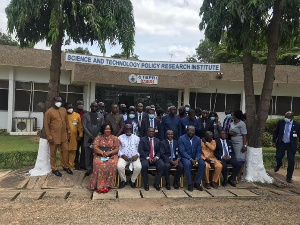 Stakeholders in a group picture
Stakeholders in a group picture
Stakeholders in the area of research and development (R&D) have called on the Council for Scientific and Industrial Research (CSIR) Ghana to present data on how their activities have impacted Ghanaians over the years, in order to compel government to fulfill its commitment to allocating 1 percent of the country’s GDP to the sector.
The Finance Minister, Ken Ofori Atta, in previous budget presentations pledged that government would commit 1 percent of the country’s GDP to research and development through science and technology to advance the economic wellbeing of Ghanaians.
But speaking at stakeholder meeting with directors of the CSIR Ghana, the Chairman of Parliamentary Select Committee on Environment Science and Technology, Dr. Emmanuel Marfo, said there is no data to support the contribution of science and technology to the economy of Ghana, hence hampering decisions to allocate funds for the area.
“So far, we have not been able to provide very solid data on the contribution of science and technology to the economy of this country. The time has come for us to begin that conversation, to think through and provide solid data to justify the allocation of resources from government,” he said.
He explained that even though it is general knowledge that science and research have aided in the country’s development, there are no data to assess their direct impact on ordinary Ghanaians.
This, he said, has made it difficult for policymakers to allocate resources for research and development; thus affecting the growth of science and technology in the country. “We are here to drum home the importance of making the contribution of science and technology known to policy by providing data so that those who manage the finances of this country will come to appreciate the contributions,” he stressed.
Citing some examples, Dr. Marfo stated that even though there have been several instances when the CSIR Ghana has outdoored efficient products, such items have not directly reached ordinary Ghanaians – making it difficult to ascertain their impact on the economy.
He stated that if research institutes produce the best seed varieties but those seeds do not reach ordinary farmers, then no output has been achieved
Such a situation, he said, leaves policymakers with no option other than turning to products that are ready to be patronized by Ghanaians. “It is an input-output kind of scenario. Before you ask for more money you have to tell us the impact you are making. It’s our duty as scientists to demonstrate our relevance.”
Dr. Marfo advised that it is time for scientists to come out and demonstrate the impact their activities have on people through data in order to demand more resources. “Typical of scientists, we like to stay and be in the laboratory and produce papers. The time has come for us to come out and show our contribution to development.”
Speaking at the forum, the Deputy Director of CSIR Ghana, Prof. Paul Bosu, stated that engagements have commenced with relevant stakeholders to redefine the role given to research and development, to demand more resources for science and technology. He pointed out that there have been moves to reform some of the existing laws as well as change the nature and operations of some institutes under the CSIR to make them more efficient.